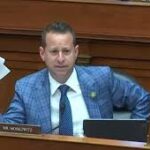Check out the website: https://lenspoliticalnotes.com Look at the recent Political Notes and Len’s Letters on the website:
August 27th, 2023 Political Note #584 Jared Moskowitz Florida 23
2024 General Election

Jared Moskowitz was elected to his first term in Congress in 2022. He replaced the retiring Ted Deutch. In August, 2022, he won the Democratic primary handily, defeating the Fort Lauderdale Vice Mayor Ben Sorensen 61-21. The general election was closer. Jared Moskowitz defeated Joe Budd, a Republican Party activist who founded Club 45, a non-profit intended to support Donald Trump’s agenda (Why that should be a non-profit might be worth exploring another time.). Jared Moskowitz had a 13,000 vote margin, winning by 52-47.
Jared Moskowitz defeated a Trumpist in a 45% white, 35% Hispanic suburban Miami district that includes Fort Lauderdale, the wealthy Boca Raton, and, Parkland, known nationally for the horrific high school shooting. With one of the highest concentrations of Jewish voters among Florida Congressional districts, it is not a surprise they would have elected a Jewish candidate to Congress.
Here is the surprise. The Democratic Jewish candidate for Congress had been working for the Republican Governor of Florida, Ron DeSantis. Before DeSantis, his career had a normal trajectory. Born in Coral Springs, he went to George Washington University and then got a JD from Nova Southeastern University, the school that Governor DeSantis is in the process of cleansing of “wokeness.” Interested in politics, Jared Moskowitz worked for Al Gore, for Joe Lieberman, and was a presidential elector for Barack Obama. While still in law school, he was elected in 2006 and reelected in 2010 to the Parkland City Commission where he made a name for himself as an environmentalist. After he completed law school, he became a lobbyist for an environmentally oriented company.
In 2012, Jared Moskowitz was elected to the Florida House of Representatives. After the Parkland shooting in 2018, he succeeded in passing a school safety act that included some gun safety elements that were hard to pass anywhere, let alone in the Republican dominated Florida legislature. In December, 2018, after he had been reelected again to the Florida House, Governor Ron DeSantis appointed Jared Moskowitz as the Director of the Florida Division of Emergency Management.
Jared Moskowitz was praised in 2018 for Florida’s share of the response to Hurricane Michael, a Category 5 hurricane. This is not to say that Hurricane Michael was anything other than devastating to Florida. Jared Moskowitz was also quick to respond to the Covid Pandemic. In March of 2020, he was in synch with Governor DeSantis who praised federal leadership, including Dr. Anthony Fauci’s guidance about how to proceed.
Governor DeSantis continued to praise the guidance he received from the Federal government. Florida shut down parks and beaches, closed public schools, prohibited visitors to nursing homes, and created curfews. In a stay at home order, he urged Floridians to stay together spiritually, but to keep distant physically. He had declared a state of emergency on March 9. The Director of the state’s Emergency Management – Jared Moskowitz – was designated as the coordinator of the state’s response.
The Director had quite a lot of authority. He could “suspend the effect of any statute, rule or order that would in any way prevent, hinder, or delay any mitigation, response or recovery action necessary to cope with this emergency.” He established Florida’s testing programs, vaccine rollout, and administered the distribution of millions of personal protective equipment to communities and hospitals across the state.
The Governor ordered the state’s adjutant general to activate the Florida National Guard “as needed.” He warned: “If you’re elderly or you have a serious, underlying medical condition, don’t get on a cruise ship right now,” he said. “Don’t get on a long flight where you could be exposed to the virus. Take certain steps to do what they call social distancing.” In the last half, even the last third of the states, the Governor ordered a lock down on April 1.
Jared Moskowitz played his part in this process. In early April, he quarreled with the 3M company. He took to Twitter to criticize the company for selling N95 masks that had been earmarked for Florida to Germany, Russia, and France, coutries that offered more money for the masks that 3M had agreed to with Florida. By 2021, as vaccines became available, Jared Moskowitz created county networks for the distribution of vaccines. He worked with community organizations, Black and Hispanic churches, and various facilities from private assisted living sites to HUD housing in a coordinated effort to vaccinate at-risk populations. Some media called him a “master of disaster.”
April was a different story. President Trump had begun to retweet calls to fire Fauci. The Governor, however, had taken a different turn. By the end of April, 2020, the governor was particularly conscious of complaints about the effect of the shut downs on Florida’s economy. On April 29, he announced the state could begin reopening. By September, 2020, Florida’s lockdown was over altogether. The governor had hired a state surgeon general who was skeptical of vaccines and fired the data scientist who was responsible for tracking Covid data. To the extent it was possible, Florida had returned to business as usual while the country had not. And the Governor could run a presidential campaign based on his view of Florida’s economy.
There were costs to DeSantis’s position. The number of cases in Florida increased sufficiently so that in June of 2021, the governor of New York considered quarantining people who traveled from Florida to New York. Notably, with 6.7% of the national population, Florida had 8.7% of the country’s Covid deaths. With the country’s second highest percentage of people over 65, if that issue were debated and generally it was not, the Governor could have pointed to the elderly population as the reason for Florida’s higher Covid death rate.
Jared Moskowitz resigned from his position as Florida’s Director of Emergency Management in February, 2021 – explaining that he needed to support his dad who had pancreatic cancer. In August, 2021 the Miami-Dade Mayor hired him to advise her on the County’s Covid response. In January, 2022, Michael Moskowitz, an attorney and a prominent donor and fundraiser for Democrats died from the cancer. In February 2022, Ted Deutch announced he leave Congress to become CEO of the American Jewish Committee. And in March, 2022, Jared Moskowitz announced he would run for what was seen as Ted Deutch’s seat – though redistricting changed things around considerably.
As he runs for reelection in 2024, Jared Moskowitz also makes his commitment to the Democratic Party clear. Without specifically making a contrast to Ron DeSantis and to the rest of the Republicans, the issue he places first in his campaign website is Protecting Democracy, particularly against the weakening of democracy that Donald Trump was responsible for. His second issue is preventing gun violence, followed by safeguarding repreoductive rights, standing for the LGBTQ community, and protecting social security, Medicare, and Obamacare.
Jared Moskowitz’s district is not as safe as, say, Ted Deutch’s district once was. If Jaren Moskowitz has a strong opponent, which he does not yet have, he will need considerable resources and have to work hard and spend those resources to win. He’ll need your help for that.
Vulnerable Incumbents in the Southeast. Because North Carolina may redistrict, they may increase the vulnerability of Democrats and add to the number of vulnerable Democrats. Florida will probably limit its redistricting to creating a single additional district where an African American has a reasonable chance to win election.
Wiley Nickel of NC 13 is #10 on Len’s List of vulnerable Democrats in the House. An attorney with Californian roots, he begins on July 1 with $700,000 in his campaign bank account. The Republican in what is now NC 13 with the most money on hand has $335,000. Len’s Political Note #551
Don Davis of NC 01 is #19 on Len’s List of vulnerable Democrats in the House. A graduate of the Air Force Academy and associated with East Carolina University, he began July with less than $280,000 – more than his potential opponents, but not enough more. Len’s Political Note #577
Darren Soto of FL 09 is #23 on Len’s List. A fourth term Member of Congress, he has raised $350,000 this early in the campaign and spent $140,000. A recently announced former county commissioner may be formidable. Len’s Political Note #585
Jennifer Wexton of VA 10 is #28 on Len’s List. A former prosecutor in her third term, she is arming herself for potential opponents and had $440,000 available as of July 1. One businesswoman has surfaced so far as an opponent.
Kathy Manning of NC 06 is #31 on Len’s List. While there is not much she can do to prevent redistricting, she is arming herself for the campaign and had $580,000 available as of July 1. One businessman has surfaced so far as an opponent.
